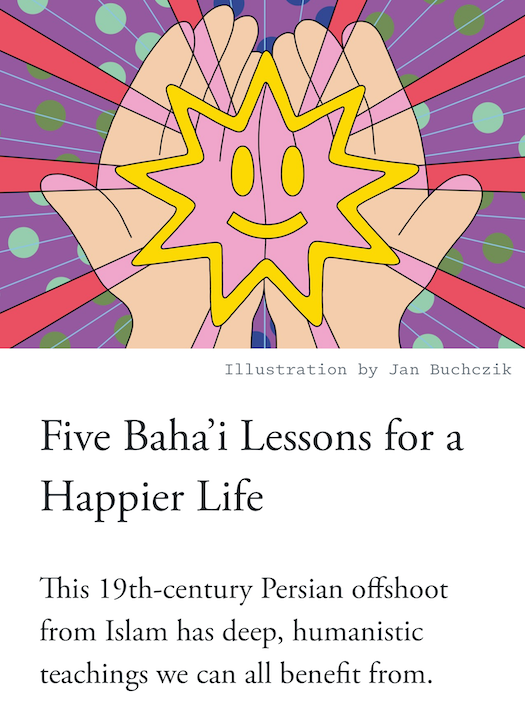
Arthur Brooks’ promotion of Bahá’í teachings overlooks the faith’s discriminatory stance toward LGBTQ+ individuals

New York, N.Y. – When Arthur C. Brooks recently penned “Five Bahá’í Lessons for a Happier Life” for The Atlantic, describing the Bahá’í faith as a “19th-century Persian offshoot from Islam” with “deep, humanistic teachings we can all benefit from,” he painted an appealing picture of universal wisdom and inclusive spirituality.
Yet this portrayal glosses over a fundamental contradiction at the heart of Bahá’í doctrine: a faith that proclaims unity and universal love while simultaneously excluding LGBTQ+ individuals from full participation unless they suppress their authentic selves.
As someone who explored the Bahá’í faith during college, drawn by its emphasis on the unity of humanity and progressive social principles, I discovered firsthand that this supposed universality has significant limitations. The faith’s teachings on human sexuality, particularly regarding homosexuality, create an irreconcilable tension between its proclaimed inclusivity and its actual practices.
The Allure of Universal Brotherhood

The Bahá’í faith, founded by Bahá’u’lláh in 19th-century Persia, presents itself as a religion for the modern age.
Its central principles include the unity of God, the unity of religion, and the unity of humanity.
These teachings emphasize racial equality, gender equity, the elimination of prejudice, and the establishment of world peace.
For a young person seeking spiritual meaning beyond traditional religious boundaries, such ideals appear profoundly attractive.
Bahá’í communities often pride themselves on their diversity and welcome newcomers with genuine warmth.
The faith’s emphasis on independent investigation of truth, the harmony of science and religion, and the elimination of extremes of wealth and poverty resonates with many progressive-minded individuals.
This initial appeal explains why the faith has attracted followers worldwide, particularly among educated, socially conscious seekers.
The Bahá’í writings contain numerous passages celebrating human diversity and dignity. Bahá’u’lláh wrote extensively about the nobility of human beings and their inherent worth regardless of background.
This philosophical foundation creates reasonable expectations that all individuals, regardless of their personal characteristics, would find acceptance within Bahá’í communities.
The Reality of Conditional Acceptance
However, beneath this veneer of universal acceptance lies a more complex reality. Bahá’í teachings
explicitly consider same-sex relationships as contrary to divine law. The Universal House of Justice,
the faith’s supreme governing body, has repeatedly affirmed that marriage is exclusively between
one man and one woman, and that sexual relations outside this framework are prohibited.
For LGBTQ+ individuals, this creates an impossible choice: remain true to their authentic selves while being considered spiritually deficient, or suppress fundamental aspects of their identity to gain full acceptance within the community. This is not the kind of “happiness” that Brooks suggests Bahá’í teachings can provide to “all” people.
The Bahá’í approach to homosexuality differs from some other religions in that it doesn’t condemn individuals for their orientation, but it does prohibit them from expressing their sexuality in loving, committed relationships. Bahá’í institutions often frame this as a test or spiritual challenge, suggesting that LGBTQ+ individuals should view their orientation as an opportunity for spiritual growth through self-denial.
The Harm of Spiritual Exclusion
This conditional acceptance causes real psychological and spiritual harm. Young LGBTQ+ individuals drawn to Bahá’í teachings often experience profound disappointment and rejection when they discover these limitations. The message they receive is that their capacity for love and partnership—fundamental human experiences—is somehow flawed or spiritually inferior.
The impact extends beyond individual disappointment. LGBTQ+ Bahá’ís often struggle with cognitive dissonance, trying to reconcile their love for the faith’s principles with its rejection of their authentic selves. Some attempt to remain celibate, sacrificing intimate companionship for spiritual belonging. Others leave the faith entirely, often experiencing grief over the loss of a spiritual community they had hoped would be their permanent home.
Bahá’í communities lose valuable members and perspectives when they maintain these exclusionary policies. The faith’s emphasis on diversity and unity rings hollow when it systematically excludes individuals based on their sexual orientation or gender identity.
The Inconsistency of Progressive Values
The Bahá’í faith‘s stance on LGBTQ+ issues creates internal contradictions that undermine its progressive credentials. While the faith advocates for racial equality and women’s rights—positions that were revolutionary in the 19th century—it maintains conservative positions on sexuality that increasingly conflict with contemporary understanding of human rights and dignity.
This inconsistency becomes particularly apparent when considering the faith’s emphasis on the elimination of prejudice. Bahá’í communities work actively to overcome racial, ethnic, and economic prejudices, yet they maintain institutional prejudice against LGBTQ+ individuals. The cognitive dissonance required to maintain these contradictory positions weakens the faith’s moral authority on other social justice issues.
Modern Bahá’í apologetics often attempt to resolve this tension by arguing that divine law transcends human understanding, or that accepting LGBTQ+ relationships would compromise the faith’s integrity. However, these arguments fail to address the fundamental question of whether a truly loving God would create individuals with innate orientations only to prohibit them from expressing love in meaningful relationships.
Moving Beyond Conditional Universality
Brooks’ article, while well-intentioned, perpetuates a sanitized version of Bahá’í teachings that ignores their exclusionary aspects. True universality cannot coexist with systematic discrimination against any group of people. When religious leaders and commentators promote “universal” teachings while ignoring their discriminatory elements, they participate in a form of spiritual whitewashing that obscures real harm.
Religious communities genuinely committed to unity and love must grapple honestly with their limitations and work toward genuine inclusion. This requires more than tolerance or conditional acceptance—it demands full recognition of LGBTQ+ individuals’ dignity and their right to loving relationships.
The path to authentic universality requires religious institutions to examine their teachings critically and consider whether inherited doctrines truly reflect divine love or human prejudice. Until the Bahá’í faith addresses its treatment of LGBTQ+ individuals, its claims to universality remain incomplete and its promise of happiness remains available only to those who fit predetermined categories of acceptability.
Bahá’í: When Faith’s Universal Message Excludes Some Believers (Aug. 28, 2025)
Summary
Arthur Brooks’ recent Atlantic article promoting Bahá’í teachings as universally beneficial overlooks the faith’s discriminatory stance toward LGBTQ+ individuals. While the Bahá’í faith proclaims unity and universal love, it excludes gay and lesbian believers from full participation unless they suppress their authentic selves. This conditional acceptance causes real psychological harm and undermines the faith’s progressive credentials, creating internal contradictions between its stated values and actual practices.
#BahaiFaith #LGBTQ #ReligiousDiscrimination #SpiritualInclusion
#UniversalLove #ReligiousHypocrisy #AtlanticMagazine #ArthurBrooks
TAGS: faith and sexuality, religious exclusion, Bahá’í teachings, LGBTQ discrimination, universal love,
spiritual acceptance, religious hypocrisy, progressive religion, conditional inclusion, authentic spirituality
